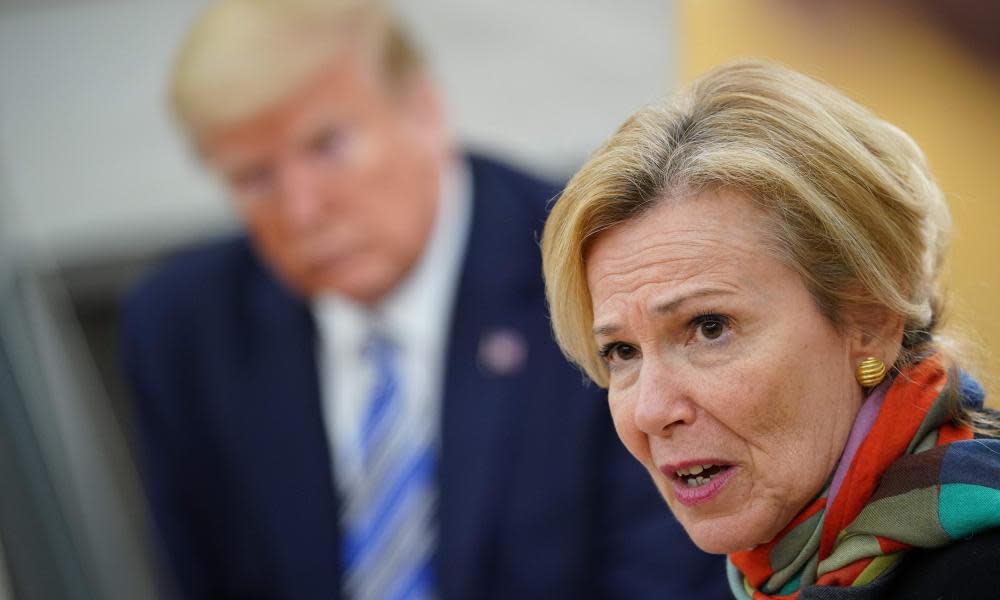Birx risks reputation in bid to keep on Trump's good side

Sometimes the story is not so much Donald Trump as the people around him, and not so much what they say but what they don’t.
Related: Trump the commander-in-bleach has been stripped of all feeling | Richard Wolffe
Last Thursday Deborah Birx sat in the White House press briefing roomas the US president speculated on whether injecting disinfectant might offer a “cleaning” of the lungs.
“Don’t do anything he just said!” is what Dr Birx should have exclaimed at that moment, argues Kurt Bardella, a political columnist and commentator, explaining: “A doctor right there has an obligation to correct that in real time. If the president wants to fire that person, then so be it.”
But Birx said no such thing.
The cringeworthy remarks about disinfectant and ultraviolet light compounded fears that Birx, the lead advocate of social distancing, has been somewhat less successful at critical distancing from the president. Like other White House officials before her, she is said to be sacrificing a hard-won professional reputation at the altar of Trump’s vanity.
Critics note that she has repeatedly failed to speak out against the president’s false and potentially dangerous claims when the occasion demands. Worse still, in an apparent attempt to stay in his good graces, the 64-year-old doctor and diplomat has praised Trump and even sided with him in jabbing at the media.
Bardella, a former spokesman and senior adviser for the House of Representatives’ oversight committee, said: “A doctor’s responsibility first and foremost is to tell the truth and correct falsehoods that could do people harm. I don’t think it’s realistic or possible to pander to Trump but also maintain fidelity to science.”
Although everything in Birx’s career prepared her for a global pandemic, nothing could have prepared her for a mercurial boss with a tendency to parrot bad science.
Her professional life began in 1985 with the defence department as a clinician in immunology, specialising in research on a vaccine for HIV/Aids. Birx was promoted to director of the US military HIV research program at the Walter Reed Army Institute of Research from 1996 to 2005. She helped lead one of the most influential HIV vaccine trials in the world and was promoted to colonel.
Birx went on to lead President George W Bush’s Pepfar programs combating HIV/ Aids around the world, managing an annual budget of more than $1.5bn. She is now one of two women on the White House coronavirus taskforce, where Vice-President Mike Pence has described her as his “right arm”.
Another prominent taskforce member, Anthony Fauci, the director of the National Institute of Allergy and Infectious Diseases, is widely regarded as having walked the diplomatic tightrope more successfully. He contradicts and corrects the president’s false claims at times, while holding his tongue or offering gentle praise at others.
Birx has been a team player to a fault, careful not to aggravate Trump by tempering his wild medical ruminations and exaggerations about testing capacity. On the contrary, last month she told the Christian Broadcasting Network: “He’s been so attentive to the scientific literature and the details and the data. I think his ability to analyse and integrate data that comes out of his long history in business has really been a real benefit during these discussions about medical issues.”
Such remarks have provoked a backlash.
Joe Lockhart, a former White House press secretary, tweeted: “I, for one, am no longer interested in hearing from Dr. Brix [sic]. Her vouching for Trump’s vast scientific abilities from his business background was the breaking point. Stepford Doc” – a reference to The Stepford Wives, a 1972 satirical novel about submissive housewives who lack free will.
It’s cringeworthy and embarrassing, but I’m guessing she thought in Trumpland, this is what’s required
Charlie Sykes
The disinfectant debacle inflicted a severe political wound for Trump but also caused collateral damage to Birx. When she was pressed about the issue later on two Sunday politics TV shows, she claimed this is merely the way Trump processes new information and expressed frustration that the media had not moved on. “It bothers me that this is still in the news cycle,” she told CNN’s State of the Union.
Emily Nussbaum, a staff writer at the New Yorker magazine, tweeted: “Dr Birx is going to leave a horrible legacy. It’s one thing to be a cynical paid fixer. It’s worse, in my eyes, to be the expert who props up the mad king. I get that it’s an emergency & I understand the theoretical strategy she may think she’s pursuing, but it’s a moral horror.”
Birx is not the first White House official to find themself walking a tightrope. Memoirs of the Trump era are replete with anecdotes about senior staff removing documents from the president’s desk or accidentally-on-purpose forgetting to pass on his orders.
Charlie Sykes, founder and editor-at-large of the Bulwark website, explored the moral quandary earlier this month in an article headlined, “The Faucian Bargain”, and said this week: “If Dr Birx and Dr Fauci were not in the room, decisions might have been made that cost tens of thousands of lives, but the price for them is to flatter and fawn.”
Of Birx’s silence over disinfectant at the crucial moment when the cameras were rolling, Sykes commented: “It’s cringeworthy and embarrassing, but I’m guessing she thought in Trumpland, this is what’s required. It’s a trade-off, and I don’t envy her position. If she had said, ‘This is terrible and the president put people in danger’, she’d be gone and replaced by someone even less willing to speak truth to power.”

